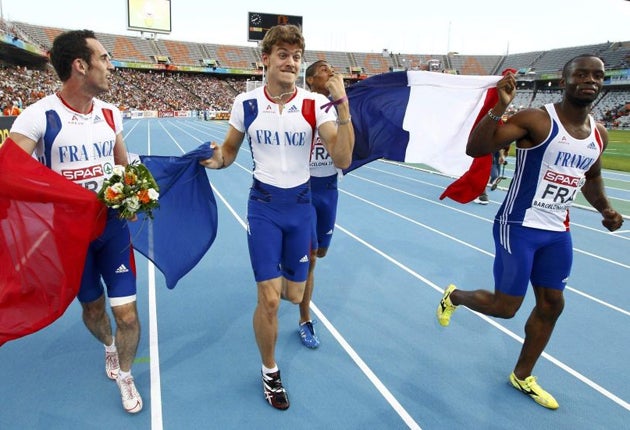Lemaitre tastes gold for third time to create piece of history
Sprinter helps France win 4x100m relay to add to his 100m and 200m titles

Christophe Lemaitre become the first sprinter to win three golds at the European Championships after helping France to the 4x100m relay title last night.
Lemaitre ran the second leg down the back straight before Martial Mbandjock raced past Italy's Maurizio Checcucci to help France to the win in 38.11 seconds.
Lemaitre became the first Frenchman to win the 100m-200m sprint double – and the seventh overall – earlier in the championships. Italy took silver in 38.17 and Germany bronze in 38.44 at Barcelona's Olympic stadium. Mbandjock also added a third medal to his tally after taking bronze in the 100m and 200m.
Despite his successes in Barcelona, however, Lemaitre is not ready to race against Usain Bolt or Tyson Gay, according to former Olympic champion Valery Borzov. "He's young and he's strong but I'm a little sceptical," Borzov said before yesterday's 4x100 race. "He needs to get to 9.60 [seconds] and it's not possible now, maybe only in a few years. I'm not sure he can compete with the Americans or the Jamaicans."
Borzov won the 100m and 200m at the 1972 Munich Olympics for the former Soviet Union and is a four-time gold medalist at the Europeans.
Lemaitre won the 100m in 10.11 seconds and the 200m in 20.37 in Barcelona. Bolt's world records in those two events are 9.58 and 20.13; Gay has the world's second fastest 100 time of 9.69.
Former Olympic champion Sebastian Coe, however, did not expect Bolt or Gay to dismiss Lemaitre, whose personal best is 9.98. "They won't be laughing because competition at the highest level is not just about times," said Coe, who twice won 1,500m Olympic gold and is the head of the London 2012 Olympics organizing committee.
"Lemaitre is 20 years old, he has two very good training years and competitive years in front of him. He has to be quicker. It would be very surprising though if he was slower in two years' time than he is now."
Coe also believes that holding the European Championships every two years will help make athletes from the continent more competitive at global events, even though the next edition will be held just a month before the 2012 Olympic Games. The 2012 European Championships in Helsinki will be staged from 27 June to 1 July. The London Olympics get under way on 27 July.
"We have to get a tradition of running back again, but I do think that tradition is better served by having a European Championships in the public domain twice every four years [rather] than once every four years," Coe explained yesterday.
"I think that every two years is a very good thing. I've always believed actually that if we were restructuring this again we would have had the continental championship every two years and the world championships only once every four years. So I think this is about as good as it will get," he added.
The European championships have largely been staged every four years since their debut in 1934 but a change in schedule was proposed in 2007, when 47 of the 50 European Athletics member federations accepted a biennial event.
Britain's head athletics coach, Charles van Commenee, explained to a news conference on the eve of this year's European Championships in Barcelona that, by staging the event every two years, they were in fact in danger of devaluing it.
The Dutchman also said that it was unlikely any British track athletes selected for the 2012 Olympics would compete at the Europeans in Helsinki because of the proximity of the two events.
But Coe was quick to brush these fears aside, saying: "Athletes will make a judgment about what suits their plans. I don't think we should get too excited about it [the closeness of the events]. It happens occasionally.
"It just happens that this year the Olympic Games happen to be in Europe. It makes life a little more complicated but it is still important that we have important events every two years. I think athletes will have to decide for themselves [whether to compete in both], but that's what good coaching is about."
The director general of the Spanish athletics federation, Jose Luis de Carlos Macho, also did not think having the two events in 2012 would pose a problem.
"The majority of Spanish athletes will compete in both and it's only possible that there'll be a few exceptions," he said. "The Spanish federation prefers that the Europeans are held every two years. It's a step forward for European athletics."
Join our commenting forum
Join thought-provoking conversations, follow other Independent readers and see their replies
Comments
Bookmark popover
Removed from bookmarks